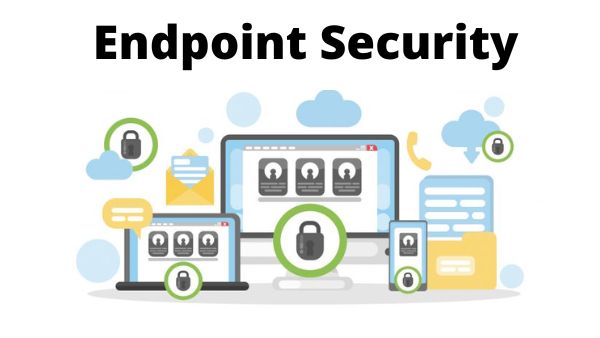What Is Endpoint Security?

Endpoint security is the technique of preventing hostile actors and campaigns from exploiting endpoints or entry points of end-user devices, such as PCs, laptops, and mobile devices.
These endpoints on a network or in the cloud are protected against cybersecurity threats by endpoint security systems. Traditional antivirus software has developed into endpoint security, which now offers thorough defence against sophisticated malware and dynamic zero-day threats.
Nation-states, hacktivists, organized crime, and purposeful and unintentional insider threats pose a hazard to businesses of all sizes. Among the first places firms look to defend their enterprise networks is endpoint security, which is frequently considered the frontline of cybersecurity.
The demand for increasingly sophisticated endpoint security solutions has constantly increased along with the volume and complexity of cybersecurity threats. Endpoint security systems of today are made to instantly identify, assess, block, and contain assaults as they are happening.
They must work together with other security technologies and each other to give administrators visibility into advanced threats in order to shorten detection and cleanup reaction times.
Why endpoint security is Important-
For a number of reasons, an endpoint protection platform is essential to organizational cybersecurity. Data is a company’s most precious asset in today’s commercial environment, and losing it or access to it might put the entire operation at risk of bankruptcy.
Along with an increase of endpoints overall, businesses have also had to deal with an increase in endpoint variety. Enterprise endpoint security is made more challenging by these issues on their own, but it is further complicated by remote work and BYOD rules, which make perimeter protection less effective and introduce vulnerabilities.
Additionally, the threat environment is becoming more complex as hackers constantly develop new techniques for gaining access, stealing data, and coercing people into disclosing private information.
It is simple to understand why endpoint protection platforms have evolved into must-haves in order to secure contemporary enterprises when you consider the opportunity cost, the cost of diverting resources from business objectives to addressing threats, the reputational cost of a significant breach, and the real economic cost of compliance violations.
How endpoint protection works
Protecting the information and processes related to the specific devices that connect to your network is known as endpoint security. Platforms for endpoint protection (EPP) look at files when they enter the network to function.
Modern EPPs use the power of the cloud to store a constantly expanding database of threat data, relieving endpoints of the bloat caused by having to store this data locally and the upkeep needed to keep these databases current. Increased speed and scalability are also made possible by accessing this data on the cloud.
System administrators have access to a centralised panel through the EPP, which is installed on a network gateway or server and enables cybersecurity experts to remotely manage security for each device. The client software is then assigned to each endpoint; it can either be installed locally on the device or provided as a SaaS and controlled remotely.
After the endpoint is configured, the client software can remotely manage corporate rules, authenticate log-in requests from each device, and send updates to the endpoints as needed. Application control, which prevents the use of illegal or risky programs, and encryption, which lessens the risk of data loss, are two methods through which EPPs safeguard endpoints.
The EPP can swiftly identify malware and other dangers once it is configured. A component for endpoint detection and response (EDR) is also a part of some solutions. Advanced threats like polymorphic attacks, fileless malware, and zero-day attacks can be found thanks to EDR capabilities. The EDR system can provide enhanced visibility and a range of response options by utilising continuous monitoring.
EPP solutions come in on-premises and cloud-based configurations. Despite the fact that cloud-based technologies are more scalable and easier to integrate with your existing infrastructure, some regulatory or compliance requirements could call for on-premises security.
What’s considered an endpoint?
Endpoints can include less-commonly thought-of gadgets like:
- Tablets
- Mobile devices
- Smart watches
- Printers
- Servers
- ATM machines
- Medical devices
An device is regarded as an endpoint if it is linked to a network. The number of individual devices linked to an organization’s network can easily increase into the tens (and hundreds of thousands) as BYOD as well as the Internet of Things gain in popularity.
Endpoints are a favourite target of adversaries because they serve as entry sites for threats and malware, especially mobile as well as remote devices. Think of the newest wearable watches, smart devices, voice-controlled digital assistants, as well as other IoT-enabled smart devices to see how mobile endpoint devices have evolved beyond only Android and iPhones.
Our automobiles, airlines, hospitals, and even the drills on oil rigs today all have network-connected sensors. The security solutions that safeguard the various endpoint kinds have also had to change as they have grown and matured.
Endpoint security components
Endpoint security software often has the following essential elements:
- Using machine learning classification to quickly find new threats
- Protection from malware across a variety of endpoint devices and operating systems is provided by advanced antivirus and antimalware software.
- proactive web security to guarantee secure web browsing
- To stop data loss and exfiltration, use data classification and loss prevention.
- A built-in firewall to thwart malicious network attacks
- Email gateway to stop attempts at phishing and social engineering made against your staff
- Administrators can swiftly isolate infections thanks to actionable threat forensics.
- Protection from insider threats to prevent purposeful and inadvertent behaviour
- Platform for centralised endpoint management to increase visibility and streamline processes
- To stop data exfiltration, use endpoint, email, and disc encryption.
Endpoint protection vs. traditional antivirus
Traditional antivirus solutions & endpoint protection platforms (EPP) differ in several important aspects.
Network security vs. endpoint security
Antivirus software is made to protect a single endpoint by providing visibility into and, frequently, access to only that endpoint. However, endpoint security software takes a holistic approach to the company network and can provide visibility of every connected endpoint from a single place.
Administration
The user has to manually update the databases or permit updates at predetermined times in order to use legacy antivirus systems. EPPs provide interconnected security that transfers management duties to an organization’s IT or cybersecurity staff.
Protection
Traditional antivirus programmes searched for viruses using signature-based detection. This implied that you might still be at danger if your company was Patient Zero or if your users hadn’t recently updated their antivirus software.
Modern EPP systems are automatically kept up to date by utilising the cloud. Additionally, previously undetected risks can be discovered based on suspicious behaviour by using technology like behavioural analysis.
How enterprise endpoint protection differs from consumer endpoint protection–
| Enterprise Endpoint Security Protection | Consumer Endpoint Security Protection |
| Superior at managing a variety of endpoint collections | Only necessary to handle a few single-user endpoints |
| Software for a central management hub | Independent setup and configuration of endpoints |
| Remote management capabilities | Seldom needs remote management |
| Remotely sets up endpoint security on devices | Directly configures endpoint security on a device |
| Patches are released to all relevant endpoints. | Each device’s user enables automatic updates |
| Calls for modified permissions | Uses administrative rights |
| Being able to keep an eye on employee activities, gadgets, and conduct | Only one user’s actions and behaviours are permitted |
Top Endpoint Security Software
- CrowdStrike Falcon Endpoint Protection
- Bitdefender GravityZone
- McAfee Endpoint Security
- Kaspersky Endpoint Security for Business.
- Symantec Endpoint Protection.
- Malwarebytes Endpoint Protection.
- VMware Carbon Black Cloud.
- Sophos Intercept X.
- Microsoft Defender for Endpoint
- What is Cybersecurity? Everything You Need to Know
- Cyber Threat and Security
People May Ask
What is definition of endpoint security?
Endpoint security is the technique of preventing hostile actors and campaigns from exploiting endpoints or entry points of end-user devices, such as PCs, laptops, and mobile devices. These endpoints on a network or in the cloud are protected against cybersecurity threats by endpoint security systems.
Is a firewall endpoint security?
Cybersecurity solutions for network endpoints are referred to as endpoint security. These services could include firewall, antivirus, and email and online screening.
What Are the Different Types of Endpoint Security?
There Are the Different Types of Endpoint Security
- Internet-of-Things (IoT) Security
- Network Access Control (NAC)
- Data Loss Prevention
- Insider Threat Protection
- Data Classification
- URL Filtering
- Browser Isolation






